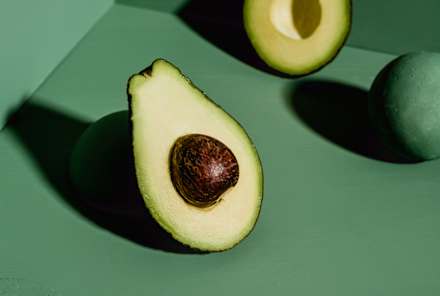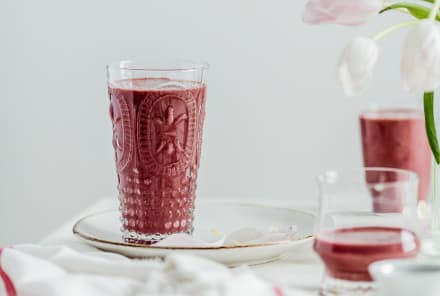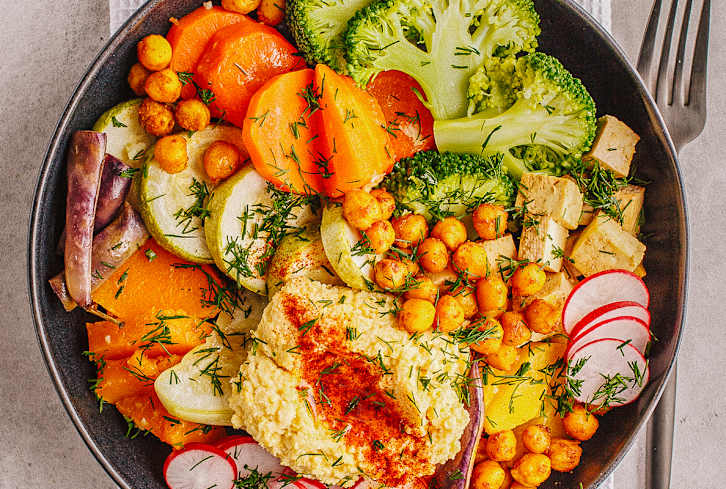Advertisement
7 Things To Keep In Mind About Exercise If You're Vegan



Many people believe that following a vegan diet can create a hurdle when it comes to achieving your fitness goals. This is not true! As a college-athlete-turned-fitness-expert and "Badass Vegan" I've learned there are certain things about exercise we need to know in order to get the results we want.
From managing your mindset to getting your daily dose of protein, my "badass" tips will help make a vegan diet the best aid to achieving your fitness goals.
1. You can be vegan and achieve any of your goals. Really.
There are many myths associated with veganism and fitness. One of the biggest and oldest myths is that you cannot be in great shape and be vegan. That's not true: Many people are flourishing and thriving while maintaining a plant-based diet.
2. Remember that food is your friend.
Many people believe that veganism results in tons of weight loss. This can be true since plant-based food goes through the system much faster, which can lead to weight loss. If someone is transitioning to a plant-based lifestyle and desires to maintain his or her weight, it's important to consume more meals in order to maintain a certain energy level and/or weight.
3. Eat more alkaline foods.
Plant-based food is considered alkaline food, which can help the body to flourish. For athletes—and for those who work out regularly—it can also assist the body in recovering much faster post-workout. On other hand, one 2017 study found1 that acidic foods like meat and dairy products tend to increase the acidity of your blood, which could potentially result in more acid (pain) during recovery.

4. Don't be fooled: All vegan food is not healthy food!
Well, this may come as a shock to a lot of people, but there is a category of food called "vegan" junk food. That same double bacon cheeseburger that you so love and enjoy, there is also a vegan version. Many people automatically think that just because they went vegan, a six-pack will appear. But if your goal is to be shredded and ripped, you have to consume the right plant-based meals. Therefore, eating vegan pizza and topping it off with vegan ice cream every night will not help you reach your goal.
5. If you do it right, getting enough protein is actually really easy.
Many people ask, "If you are vegan, where do you get your protein?" Yep, good old greens will pack a protein punch. One cup of cooked spinach has about 5 grams of protein. The following foods are excellent vegan protein sources: hemp hearts, pea protein milk, nuts and seeds, quinoa, tofu, lentils, seitan, and beans.
6. Keep this in mind: Food is a drug.
Yes, you read that right. Food can be the most addictive thing you put in your body. It's no wonder why the government has a division called the FDA. Research has shown2 that just like any drug (good or bad), when you cut out a food you’ve pumped it into your body for so many years, you may experience a behavioral or even physical response similar to a state of withdrawal. Now this is not the same for everyone, but that can include animal protein, and for some, may lead you to doubt your decision of eliminating animal protein. Don't worry, though: It is just the body's way of detoxification, just try to stick it out for a bit longer, and your body will soon adjust to getting protein from plant sources. If you’re concerned about avoiding nutrient deficiencies during this transition, touch base with your doctor to see if supplements to cover your needs for nutrients you may be used to getting from animal sources like vitamin D, vitamin B12, calcium, and/or iron would be appropriate for you.
7. Go into it with a positive mindset.
Doubt will creep into your mind, and many times it is that same doubt that will have many people questioning your decisions. Other times, that doubt may be self-doubt that could stem from traditions, bad habits, or the fear of the unknown. But remember that when you are changing your lifestyle, most people won't be on board, and your goals are ultimately up to you. So get ready for an incredible journey.


















